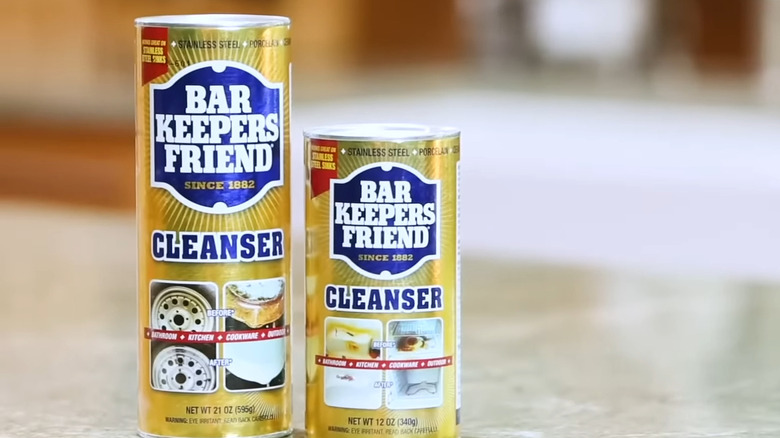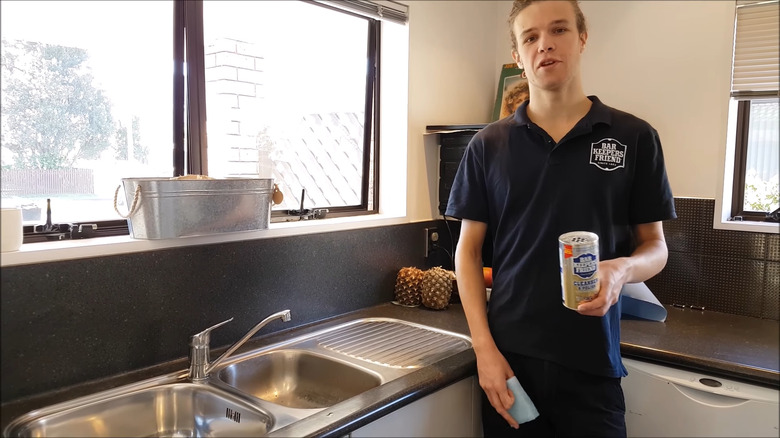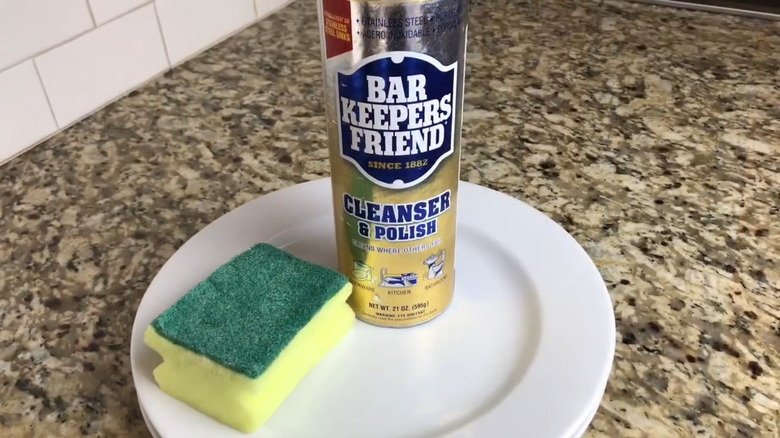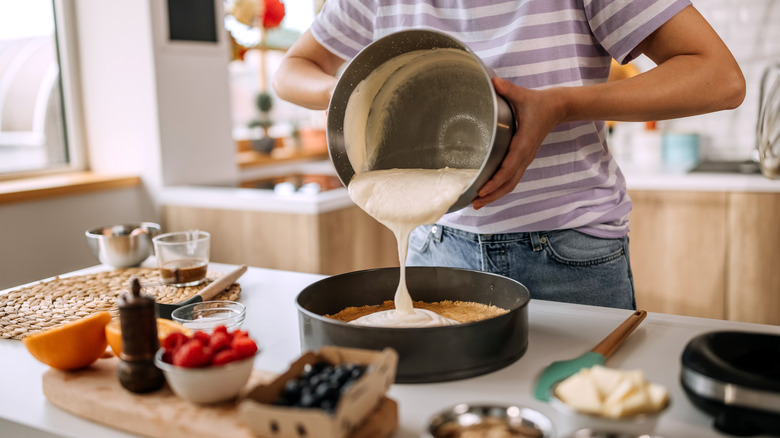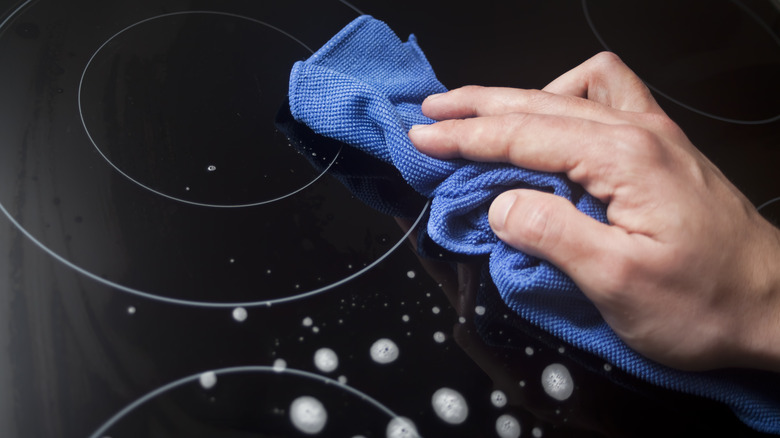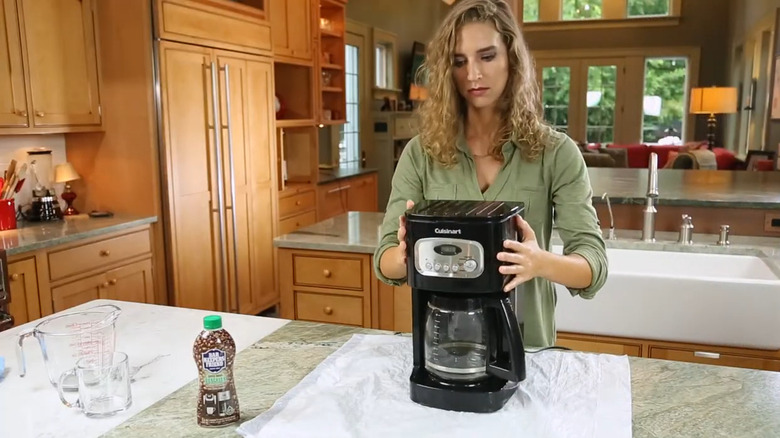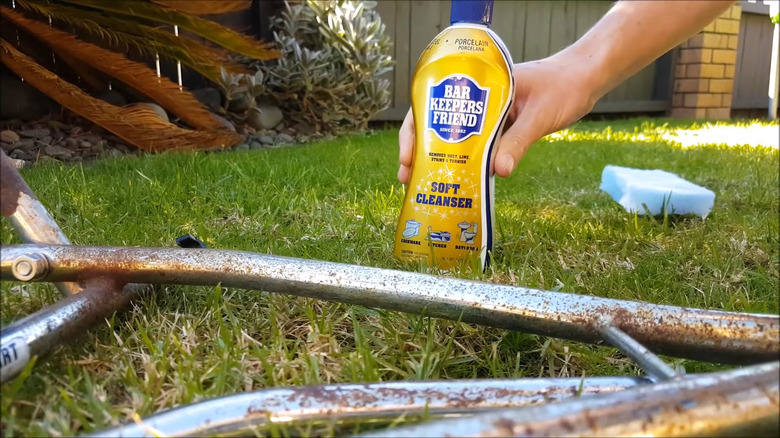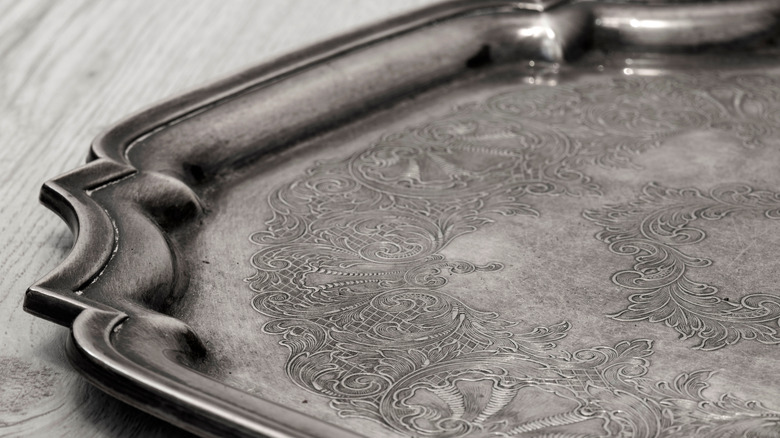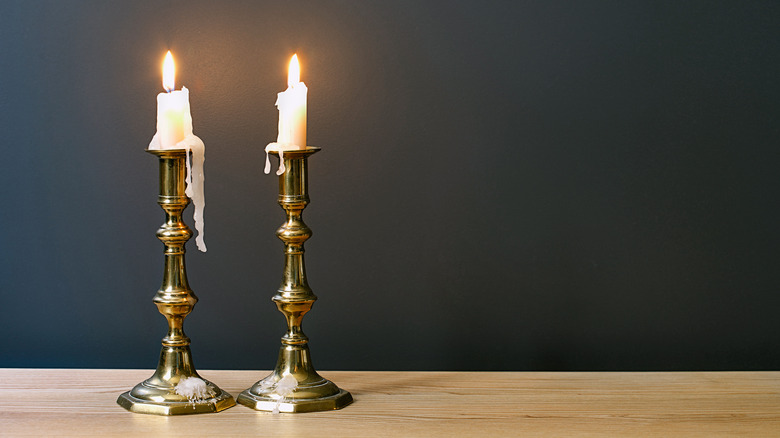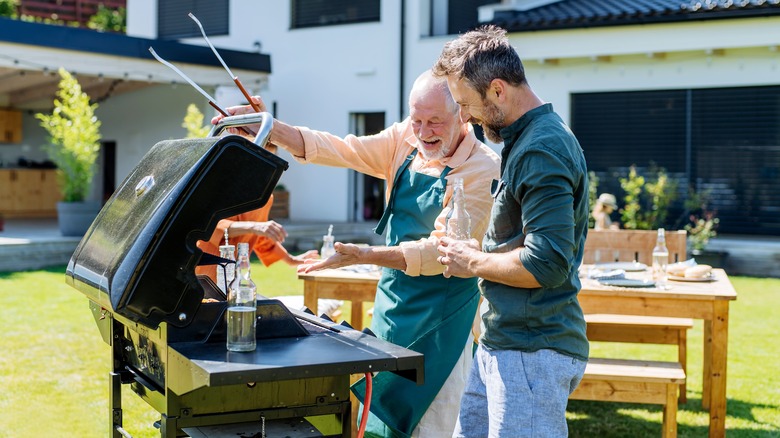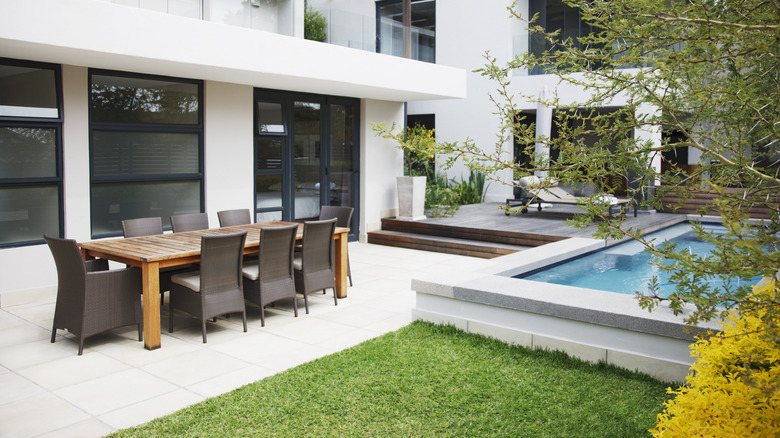All The Things You Could Be Cleaning With Barkeeper's Friend
Originating in 1882, Bar Keepers Friend is a reliable and effective cleaning product for many of the non-porous surfaces in and around your home. Without a heavy abrasive effect, the oxalic acid in BKF cuts through rust, grease, mineral deposits, and all sorts of grime. This active ingredient is found naturally in vegetables like rhubarb and spinach, and it removes unwanted stains and dirt by breaking them down on a molecular level. Based on this mild, acidic action, BKF offers several formulas to make quick work of cleaning a variety of surfaces. The company's products include Powdered Cleanser, Soft Liquid Cleanser, Coffee Maker Descaler, and more.
Enthusiastic fans of BKF use it for myriad household cleaning projects, from sinks and tubs to stovetops, bicycles, and patio furniture. It's highly effective on non-porous surfaces. However, the company warns against using BKF on fabric, leather, cast-iron cookware, wood, painted surfaces, silver-plate, marble, and granite.
Stainless steel cookware, sinks, and appliances
It happens to all of us. That stainless steel pot that glistens when it's new ends up with ugly, burnt-on, black residue from your cooking escapades. Don't give up on it. The oxalic acid in Bar Keepers Friend will cut through the cooked-on grime and bring the pot back to life. Additional ingredients, including mild abrasives and detergents, add to the effectiveness of BKF.
Start by swishing the pot in a sink of soapy water. Then apply enough BKF powdered cleaner to make a paste. Let the paste sit for no more than one minute and follow up by rubbing in a circular motion with a soft cloth. Dunk the pot back into the soapy water, wash, and rinse. Repeat this cleaning method for all your stainless steel cookware as well as flatware and sheet pans.
Both the powdered form and the liquid soft cleanser from BKF work well on stainless steel sinks, removing tarnish, rust stains, and soap scum. For stainless steel stovetops, oven doors, refrigerators, and similar appliances, BKF offers a specialized spray formula. Simply spray on the Stainless Steel Cleaner & Polish and wipe with a soft, dry cloth in the direction of the grain. For extra shine, rub on a light coat of olive oil or mineral oil and wipe away the excess with a soft, dry cloth.
Porcelain dishes, tubs, sinks, and toilet bowls
Porcelain is a tough, non-porous, ceramic material that's perfectly suited for multiple objects and fixtures around your home. Due to its hard, water-resistant nature, a porcelain surface is an ideal candidate for cleaning with Bar Keepers Friend.
For example, porcelain dishes as well as serving bowls and platters show gray scratch marks from knives and utensils. Use either the powdered formula or the BKF soft cleanser to remove these marks, leaving your dishes smooth and sparkling. The method involves using a bit of water to make a paste from powdered BKF or applying the soft cleanser straight from the bottle. Then, rub the scratched porcelain with a non-abrasive scrubber pad and rinse with water to remove the utensil marks.
To remove stains and scratches from porcelain sinks, tubs, and toilet bowls, employ similar methods. Dampen the area with water. Then apply a light coating of powdered BKF and let it sit for no more than 2 minutes. Rub in a circular motion with a soft, damp cloth. Follow up by thoroughly rinsing the cleaner off the surfaces and drying them with a soft, dry cloth or towel.
Aluminum bakeware and cookware
Although you scrub them diligently, the pots, pans, and baking sheets that you use on the stovetop and in the oven tend to get dingy over time. The residue from baked-on oils and cooking sprays can build up to leave a brown haze over their surfaces. Washing them in the dishwasher only creates oxidation and dark smudges that add to their unsightly condition. The preferred cleaning method for aluminum pots and pans is to make a paste from BKF powdered cleaner and a few drops of water. Then rub the paste into the surface with a soft cloth. Avoid abrasive scrubbers, and be sure to rinse the pans thoroughly.
Be aware that Bar Keepers Friend is not recommended for anodized aluminum cookware. This material has been electrochemically treated to form a hard coating on the surface, and BKF can damage that coating. If you're unsure what type of aluminum cookware you have, test a bit of the cleaner in a small, unseen spot. For example, you can dab a small amount of the paste made from BKF and water onto the bottom of an aluminum pan. Leave it on for no more than a minute, then wipe off, rinse, and dry. If it leaves a smudge, you'll know to avoid cleaning the pan with BKF. Additionally, you should avoid using this cleaner on coated, non-stick aluminum cookware. It can scratch the finish and ruin the non-stick quality of the pan.
Glass and ceramic cooktops
In today's modern kitchens, glass and ceramic cooktops add a sleek, sophisticated vibe to the decor. That is, if you keep the surfaces clean and shiny. Fortunately, Bar Keepers Friend makes a specially formulated cleaner for this purpose. Abrasive cleaners leave scratches on these types of cooktops, but BKF Multi-Purpose Cooktop Cleaner safely removes cooked-on grease and food residue without damaging the surfaces.
Be sure that the cooktop is cool to the touch before you begin the cleaning job. Then, rinse and wring out a non-abrasive scrubber sponge before applying the cooktop cleaner to its scrubber side. Scrub in a circular motion, allowing the cleaner to stay on the cooktop surface for no more than a minute. Turn the sponge over to the smooth side and wipe away the excess cleaner. Use a plastic scraper to loosen cooked-on messes. Finally, wipe the surface dry with a paper towel.
Coffee makers
In addition to their regular powdered and soft cleansers, BKF offers a few specialized formulas for precise cleaning tasks. The Coffee Maker Cleaner and the Coffee Maker Descaler are two examples. You can safely use both of these products on automatic drip coffee makers, espresso machines, single-cup coffee makers, and stainless steel carafes as well as coffee mugs and thermoses made of ceramic, glass, or steel. The cleaner removes the residue from oils and tannins, while the descaler is a once-a-month treatment to banish the mineral buildup that accompanies hard water usage.
While you might wash your coffee carafe on a daily basis, you may not give the coffee maker your complete attention until it starts to look dirty. Coffee makers can harbor mold, yeast, and bacterial growth. That's why it's important to give them a deep cleaning and descaling every 4-to-6 weeks.
To clean your coffee maker, add 1 ounce of BKF Coffee Maker Cleaner for every 8 ounces of cold water needed to fill the machine's reservoir. Remove the filter and run the mixture through a brewing cycle. Let it sit in the carafe for 30 minutes. Then, discard the liquid, and run a reservoir full of clear, cold water through a brewing cycle. If you have hard water, you'll want to use the Coffee Maker Descaler prior to using the cleaner. The steps for descaling are identical to those for cleaning.
Rusty flatware, knives, cookware, and hand tools
One of the most remarkable characteristics of Bar Keepers Friend is its ability to remove rust from metal surfaces. The oxalic acid in the cleaner cuts through rust on carbon steel, stainless steel, chromium, and nickel. When old tools, kitchen utensils, flatware, and knives show signs of rust, it's time to reach for either the powdered or soft cleanser form of BKF.
Begin the cleaning project for rusted metals by wetting the object with water. Then, apply a light coating of BKF and scrub with a soft sponge, avoiding abrasive materials. After the cleaner has set on the surface for no more than one minute, it's time to rinse and dry the item. If the object was heavily rusted, you may need to repeat the procedure. When the rust has been removed, wash the item in soapy water and rinse with clear water. Then, dry and polish it thoroughly with a soft cloth.
Some people recommend Bar Keepers Friend for removing rust from old cast-iron frying pans and cookware. But according to BKF, this is not a recommended use. Although the product will remove the rust, it simultaneously strips the seasoning from the pan's surface, leading to further rust problems.
Tarnished sterling silver
On their website, BKF warns that you should not use the product on gold-plated and silver-plated surfaces. However, it is safe and effective when used to clean the tarnish from sterling silver. You may be wondering how you can tell the difference between sterling and silver-plate. Look on the bottom of the item for a hallmark, resembling a stamp. Sterling silver carries a hallmark with the word "sterling" or the number 92.5, indicating the percentage of pure silver content. Additionally, you can perform a test with a magnet. It will not adhere to a sterling silver surface, but it may adhere to other metals that are coated with silver plating. Finally, if the silver surface is flaking, you'll know it's plated and not sterling.
Once you've verified that your object is sterling silver, you can proceed with confidence to remove the tarnish with BKF. Use the powdered form with a bit of water to make a paste, or use the liquid soft cleanser. Rub the cleaner onto the surface with a soft cloth. Allow it to set for one minute. Then, wipe the paste off with a damp cloth. Finally, rub the object with a dry towel to bring out the shine.
Brass candlesticks and door hinges
Many pieces of hardware as well as decorative objects around your home are made of brass. These include items like drawer pulls, door knobs, vases, cabinetry hinges, and candlesticks. You can use either powdered BKF or the soft-cleanser formula to bring out the warm, lustrous shine of brass. If you're cleaning brass-plated surfaces, you'll want to be extra gentle to avoid removing the plating. You can tell the difference by weight, as a solid brass object is heavier than a brass-plated metal object. Additionally, you can do the magnet test. A magnet will not stick to solid brass, but it will adhere to a metal that is coated with brass plating.
To clean hinges and other pieces of brass hardware, start by using a screwdriver to gently remove them from their locations. Soak the items in warm water with mild dish soap for a few minutes. Then, apply BKF to a wet sponge or cloth (not to the brass surfaces). Scrub for one minute and rinse with warm water. If the tarnish is not completely removed, repeat this procedure, making sure that BKF does not remain on the surface for longer than one minute at a time. Finally, rinse the brass objects thoroughly and buff them with a dry cloth or towel.
Outdoor grills
Cleaning your outdoor grill is a messy but crucial process to keep it in top working order. Grease residue, bits of food, and carbon buildup that are left on the grates can lead to rust and corrosion. Start by closing the lid and turning up the heat for 10-to-15 minutes to soften the cooked-on food debris and grease. Then, open the lid and turn off the burners. When the grates are cool to the touch, clean off the loosened grime with a grill brush or a wad of aluminum foil. Remove the grates and place them on a tarp on the ground. Liberally apply Bar Keepers Friend, and scrub the grates with a nylon scrubbing pad or brush. Use the "jet" setting on your garden hose to thoroughly rinse the grates before returning them to your grill. Once again, turn up the heat to burn off any residue before cooking food on the grates.
Occasionally, you'll want to deep clean the entire grill, including the outside. If the grill is exposed to the outdoor elements over time, the exterior may be in bad shape. You'll need to scrub it with BKF powdered or soft cleanser and a non-abrasive sponge. Always rub in the direction of the grain or brush lines of the stainless-steel material. If the grill's exterior is in good shape, you can use a soft cloth to apply BKF Stainless Steel Cleaner and Polish, bringing back the surface luster and shine.
Concrete patios and outdoor furniture
You may be surprised to learn that Bar Keepers Friend is an effective cleaner for cement and concrete walkways, driveways, garage floors, and patios. Wet the surface with a garden hose, then sprinkle on BKF powdered cleanser and brush it with a nylon brush or stiff broom. Rinse with water from the garden hose on the "jet" setting. The oxalic acid in BKF dissolves rust and removes stains without etching the concrete surfaces. If stains are not entirely removed, repeat the process.
While you're cleaning your patio, you'll want to put BKF to work on your outdoor furniture. The MORE Spray + Foam is a convenient specialty formula for this purpose. The acronym stands for: Mineral deposits, Oily residue, Rust stains, and Everyday grime. Use the spray setting for horizontal surfaces and the foam setting for vertical surfaces. Apply to your patio furniture and wipe with a non-abrasive sponge or cloth, leaving the cleaner on the surface for no more than one minute. Rinse thoroughly with your garden hose, and dry with a towel. Keep in mind that BKF is intended only for hard surfaces, not wood or the upholstery fabrics on your patio furniture.
Bicycles and automobiles
Bar Keepers Friend works well to keep your bicycle in pristine condition. Make a paste with the powdered cleaner and apply it to a grimy, rusted bike chain. Leave it on for 5 minutes, scrub with a brush, and rinse with water. Additionally, you can use the Soft Cleanser formula of BKF to clean your bike's handlebars, pedals, and metal frame.
Bring your dingy car headlights back to life with powdered BKF. After wetting the lens with water, apply a light coating of the powdered cleaner to make a paste. Then, rub with a soft cloth before rinsing thoroughly with water. Similarly, car wheels become grimy as they pick up oil, salt, mud, and dust. Clean the wheels with BKF MORE Spray + Foam. After spraying it on the wheel, you can scrub the surface with an old toothbrush, nylon brush, or soft cloth. Then, rinse with water.
When you're using BKF to clean bikes and automobiles, keep in mind that it's not recommended for all surfaces. Don't use it to clean painted, powder-coated, and chrome-plated surfaces. However, you can use the soft cleanser formula in small amounts to buff out scratches on your car's exterior. Similar to a polishing compound, you should rub it on with a soft, dry cloth and wipe it off immediately. For plastic hubcaps, it's best to use only the MORE Spray + Foam version of BKF and to test it in a small area before general application.
Musical instruments
Remember that old trombone from your high school band adventures? You can pull it out of the attic and bring it back to life with Bar Keepers Friend. For non-painted and non-plated brass instruments like trumpets, saxophones, tubas, and cymbals, you can use either the Powdered Cleanser or the Soft Liquid Cleanser. Apply the BKF to a microfiber cloth or nylon sponge and rub it on the instrument for one minute. Rinse with water and dry with a soft towel, buffing the surface to produce a shine.
If the brass instrument is painted, you'll need to clean it with caution, using only the liquid soft cleanser. Apply it with a microfiber cloth and rub the surface gently. Similarly, a plastic instrument requires extra-gentle treatment, using only the MORE Spray + Foam version of BKF. Test the cleaner in a small, unseen place to ensure that it does not damage the plastic. Then, dampen the instrument and spray on the foam. Rub in a circular motion with a non-abrasive sponge. Wipe off the cleaner with a damp cloth and let the instrument dry. Follow up by buffing with a soft cloth to bring out the shine.
